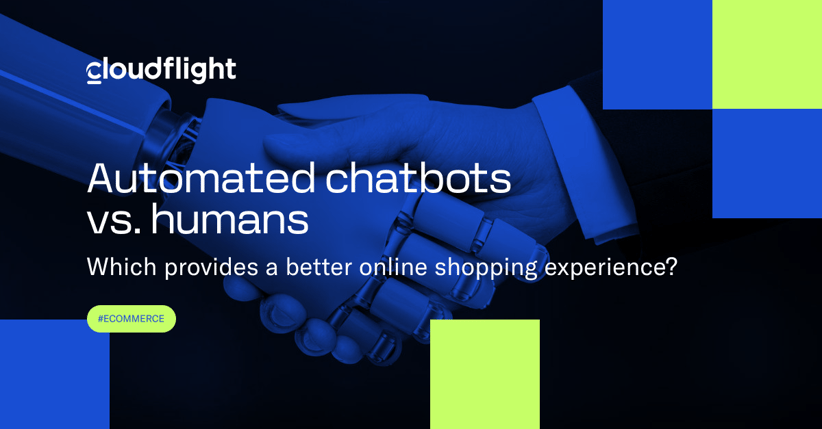Have you ever found yourself in the digital maze of online shopping, eyes dancing over a kaleidoscope of choices, and suddenly you hit a snag? That little chat bubble pops up almost like a friend waving from across the room. You click, and within a heartbeat, you're in a chat. But here's the twist; are you asking your questions to a person or spilling secrets to an AI-driven chatbot?
Get this: a jaw-dropping 67% of folks globally have been chatting it up with a chatbot for customer support in the last year. It's not just a blip on the eCommerce radar; it's a full-blown revolution in how we shop and how businesses are rolling out the red carpet for us online.
The old-school days of playing the waiting game for a human voice to crackle through the phone? They're fading away and making room for these nifty chatbots that are always up and always ready: no coffee breaks, no downtime.
But here's where it gets sticky. This whole move to digital chatterboxes opens up a can of worms. Yeah, chatbots are zippy and can juggle a million things at once. But empathizing, really getting the nuances of our human problems? That's a tough nut for them to crack.
So, in this article, we're plunging headfirst into this swirling mix of AI-driven quick fixes and the irreplaceable warmth of human connection in online shopping. We're not just tossing facts and stats at you; we're embarking on a storytelling adventure to crack the code of what makes online shopping truly magical.
Is the future all about AI wearing the crown, or is there an unshakable charm to the human touch that keeps its flag flying high? Come along for the ride as we weave through this modern tale of tech, touch, and tantalizing customer experiences.
Advantages of automated chatbots in online shopping
The emergence of chatbots is not just a tech trend. Instead, it is a strategic technique for advancing customer service operations. Below are some of the essential reasons chatbots are attaining a state of indispensability in the enhancement of the online shopping experience:
1. "Always-on" service: the 24/7 superpower
A major issue has always been the absence of help when you need it. However, imagine a world where help is readily available at all times and with no delay. Chatbots, especially sophisticated versions like those customized with ChatGPT, are programmed to be at your service endlessly, regardless of the time and requirements.
The features of being available around the clock are a game changer, especially in a globalized and always-connected world. There's always the option of asking questions, getting support, or making purchases whenever you feel like it without the fear of "closing hours," a considerable limitation of human agents.
2. Lightning-fast responses: speed is the new currency
In the digital world, a significant factor is speed, which chatbots are excellent at. They bombard you with instantaneous responses. This can be essential for retaining customers and keeping them engaged and satisfied.
It also eliminates the sorry state of consistently lengthy queues. A chatbot is equipped to handle multiple queries concurrently and in a timely manner to ensure no question is left unanswered.
3. Personalized recommendations
Chatbots, which use artificial intelligence (AI), are equipped with analytics tools to analyze individual shopping behavior, choices, and buying histories. The data obtained by chatbots is used for both designing and personalizing product offers according to personal preferences. Correspondingly, they provide consumers with customized recommendations that improve consumers' shopping experiences.
4. Data handling and analytics
The statement, "Chatbots are not just conversation partners; they’re data engines,” was made by Michael Maximoff, the Co-founder and Managing Partner at Belkins. This signifies the abilities of chatbots for being able to not just analyze interactions but also generate useful insights pertaining to customer behavior and choices. Because of this, data gathered by chatbots is useful for enhancing and tailoring product offers to consumers alongside market personalization and improvement of customer experience.
Advantages of human customer service in online shopping
The digital marketplace, centralized largely by clicks and codes, is balanced by the human element in customer service by playing a role in providing a personal touch and empathy. This section explores the peculiarities of human customer service, especially in online shopping, by highlighting its irreplaceable contributions in the rapidly evolving automated world.
1. Emotional intelligence
An undisputable attribute of humans over a chatbot is the ability to perceive and respond to emotions. During interactions, a human representative can identify and successfully navigate clients' emotions by helping a frustrated or confused consumer appropriately through understanding and tact.
2. Complex problem solving
A vital human characteristic is managing intricate or unplanned situations. This is opposed to chatbots, which are strictly limited to certain outlined requirements and programming. Human representatives are untethered by these constraints and equipped to think and act outside the box.
Because of this, humans providing customer service are a source of creativity, especially in managing peculiar difficulties. For instance, if a challenge arises pertaining to customers outside the query categorization a chatbot has been programmed for, a bot is practically ineffective. However, this does not pertain to humans because they can use their sense of judgment and experience to provide customized solutions to prevent a negative experience.
3. Building trust and loyalty
The consciousness of your question being attended to by fellow human beings is associated with an expected level of reassurance as opposed to a bot. The role of human interaction in customer service is seen in fostering trust and loyalty.
In recent times, studies have shown that an estimated 70% of a customer’s journey is based on how they perceive they are being treated. This statistic underscores the essential role of human interaction in promoting customer loyalty.
4. Flexibility in communication
Every human being is wired to seamlessly adapt to the various situations and constantly evolving changes around us. This major attribute is also seen in the human ability to easily tweak their communication style and pattern to fit appropriately with the needed situation and customer needs.
Fernando Lopez, Marketing Director at Circuit, points out that despite all the pros of AI, having a line with a human is still required.
"Some categories of customers do not feel good about AI-enhanced chats. I am referring not only to seniors or people with disabilities. Human support is helpful for companies with a broad range of products or services, complicated names, and sophisticated website structures. Their potential clients or users may suppose their request may go out of the usual scenario suggested on the AI-enhanced chat. If you want to help, give them someone who can understand and overcome their frustration.”
Humans are better equipped to explain complex policies or incorporate customers' desired communication styles. This translates into an improvement in customer satisfaction with customers feeling seen, appreciated, and understood.
5. Building brand image
The place of human agents in customer service is not limited to problem-solving skills; they play a crucial role in promoting the brand as ambassadors. While interacting with customers, they have a frontline role in defining and projecting the brand's image and reputation. A positive and helpful human interaction can create a positive impression on customers, urge them to engage with word-of-mouth recommendations, and increase brand imaging.
Takeaways
Think of automated chatbots as heroes that are always ready to spring into action. They resemble guardians of customer service by setting new benchmarks in responsiveness and efficiency. However, like all heroes, they have their weaknesses that can be found in those emotional and nuanced challenges that sometimes require more than just data and programming to unravel.
Then there are our customer service agents; the empathetic magicians who sprinkle their touch of humanity throughout a customer’s shopping journey. They are similar to shopkeepers with the conversational artistry needed to turn a problem around with a smile and kind words. Yet, even these wizards have their constraints as concerns about scalability and variability serve as reminders that they are delightfully human all.
The key takeaway from this isn't a binary choice between AI and human interaction but an appreciation of their complementary strengths. The optimal path forward for businesses lies in a harmonious integration of both by leveraging the efficiency of chatbots while ensuring the warmth and empathy of human service remain accessible.
Brooke Webber is a passionate content writer with a love for storytelling. Brooke has 5 years of experience in crafting compelling narratives that resonate with audiences across industries. Total coffee addict. During her spare time, she immerses herself in literature.
Published January 24, 2024









